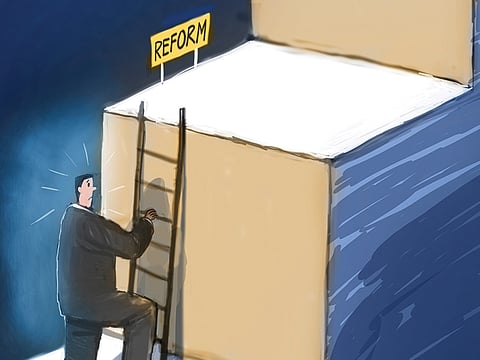Delay on UN reforms will erode credibility
The Security Council should not fall into the morass of a low-level debating club whose members go home after saying their piece, content that their self-interests were protected

The year 2015 produced a “mixed bag” of results for the United Nations, comprising of the positives, the still-in-the-works issues and the totally negative ones.
“The Paris Agreement on climate change is a sign of hope in troubled times. It is a triumph for multilateralism that shows the United Nations delivering results the world desperately needs,” UN Secretary General Ban Ki-moon observed during his year-end press conference reviewing UN activities in 2015. The Paris accord, Ban said, had “surpassed all expectations”.
Another 2015 milestone, according to the UN chief, was the recently adopted 2030 Agenda for Sustainable Development and its “crystallised” 17 Goals which stand as an “overarching guide” to end poverty and build peaceful societies.
Progress — or, at least, signs of it — were also sighted as Sri Lanka and Nigeria went through power transitions; there were also “encouraging signs” of similar transitions in Cyprus, Columbia, Myanmar, etc.
Then there was the Ebola epidemic which was brought to an end in Sierra Leone, Liberia, and Guinea. Even Syria presents a ray of hope of containing the country’s terrible humanitarian disaster, with the parties in the conflict agreeing to return to the negotiating table. But Ban also referred to the “epic flows” of refugees and internally displaced persons (IDPs) in 2015.
The UN has asked for $20 billion (Dh73.4 billion) to meet next year’s humanitarian needs, which is five times the level ten years back. 2016 will likely begin with a funding deficit exceeding $10 billion — the largest ever. UN funding will figure at the World Humanitarian Summit in May 2016 in Istanbul, Turkey, which will also discuss concrete steps to better prepare for crises.
The world must invest more political energy to prevent and end conflicts, quickly addressing violations of human rights which provide the best early warning signs of greater trouble to follow; preventive diplomacy is the mantra for containing a conflict in its infancy. Uncontrolled conflicts such as those in Libya, Yemen and Syria are potential breeding grounds for terrorism and extremist ideology. Wars and conflicts also produce staggering numbers of refugees and IDPs; indeed, one of the most difficult challenges facing the UN and the regions affected is the management of mass exodus of entire civilian populations which can create huge social problems and a drain on resources of countries hosting them.
The UN will soon witness campaigning to find a successor to Ban Ki-moon whose two-term Secretary General tenure will end in 2016. Names of two female candidates from Bulgaria to helm the UN affairs are being mooted to end what has become a male domain, though male candidates may also join the race. It is Eastern Europe’s turn, by geographic rotation, to present a candidate for the post. However, m Member states want greater transparency and fairness in the selection process; the international community is resentful of the past secretive and monopolistic selection process of the Security Council’s five permanent members (P-5) — China, France, Russia, UK and USA — who among themselves chose a candidate and presented him to the majority as a fait accompli.
Veto and conflict resolution
The member states also want to see urgent reforms of the UN and, particularly, the Security Council which has not shed its antiquated and fossil-like character that is out of touch with present-day realities; the veto-armed P-5 are criticised for their high-handed decisions, guided by their self-interest and not by the principle of finding a just and quick conflict resolution, thus prolonging and exacerbating the resulting human misery. Of course, the world needs the UN; the world would, to use the metaphor, go from the frying pan into the fire if the world body did not exist. But the UNSC should not fall into the morass of a low-level debating club whose members go home after saying their piece, content that their self-interests were protected.
The world increasingly believes that the veto has become an obstacle in the way of conflict resolution. Russia and China were both sharply criticised for twice aborting the draft resolution that supported the Arab League’s plan to end violence and herald a political transition in Syria. The result was devastating for the Syrian civilian population with an estimated 220,000 casualties and millions displaced. Russia and China are arms suppliers to the Syrian regime; Russia also fears that by jettisoning the Bashar Al Assad regime, Moscow would lose its strategic foothold in the Middle East which provides it access to a warm water port.
The ideal solution would be to replace the veto power with individual voting right for each of the members of an expanded UNSC. Resolutions could then be passed based on majority votes with each member, including newcomers, casting a single vote. If the P-5 members obstructed UNSC reforms, history would judge them as power-hungry villains of international diplomacy showing little concern for the problems and needs of humanity.
The light at the end of the tunnel finally appeared when the General Assembly adopted in September a consensus-based negotiating text that contained positions of UN member states on Security Council reforms, outlining how the 15-member body should be expanded into permanent and non-permanent categories.
The goal should be to create a “smart” UN that is agile, result-oriented and fit to deal with issues, breaking the shackles of a heavy-handed international bureaucracy. All members agree that reforms are urgently needed; foot-dragging can only erode its credibility.
Manik Mehta is a commentator on Asian affairs.


